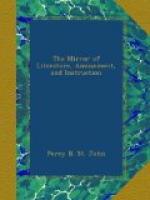That loved-one yet is here; and flowers,
and songs,
And streams—to
gush above her own free feet
Of stainless ivory,—and countless
throngs
Of birds are living, her pure
soul to greet.
And the lone spirit, thoughtfully that
longs
For a dim view of Eden, from
a seat
O’erhanging some green valley, now
espies
Nought that might dread compare with Paradise!
There is a glory gone forth from on high!—
It quickens the heart’s
beat, whereon it flings
Its fervour;—the flushed cheek
and glowing eye
Confess its influence;—and
the many strings,
Voiceless too long in the young heart,
reply
To the mute promptings of
a thousand things
Which Spring has conjured up;—all,
all is hers—
That Glory without name—she
ministers.
Now—all the thoughts she wakens
in the heart
Are glorious Music!—divine
Poesy!—
Now—all the dreams on Fancy’s
eyes that start,
She will disown not, wayward
though they be.
Sweet Dreams!—down Lethe’s
billow they depart—
Words are too weak to clothe
them worthily.
Rich incense, burnt upon some altar stone
Censerless,—in a temple—desert—lone!
What shall we do in these delightful days,
When the full, bounding heart,
will not be still;—
When the glad eye, absorbed in far-sent
gaze,
Forgets Earth’s plenitude
of grief and ill;—
Shall we dream on, in a bewitching maze
Of sweet affections and bold
hopes, until
Earth is not Earth—but Heaven?
or shall we die
Hourly, to some “dissolving minstrelsy?”
Sometimes, when day is dying—when
twilight
Brings its dim Vigil,—hour
of quietness,—
’Tis sweet to listen, till the cheated
sight
Pictures strange shadowings
of awfulness,—
Some wild, old tale of goblin’s
ghastly spite,
Or antique strain of passionate
distress;—
And one, which has been wept o’er
many a time
I seek, to mar, perchance, with feeble
rhyme
May, 1828.
Thomas M——s.
* * * * *
EXECUTION AND LAST MOMENTS OF LORD WILLIAM RUSSEL.
(For the Mirror.)
This distinguished patriot and martyr to the cause of liberty was the third son of William, the first Duke of Bedford, by a daughter of the Earl of Somerset. He refused the generous offer of Lord Cavendish to favour his escape, by changing clothes with him in prison; and he also declined the Duke of Monmouth’s proposal to surrender himself, should Lord William Russel think it might contribute to his safety. “It will be no advantage to me,” he said, “to have my friends die with me.” Conjugal affection was the feeling that clung to his heart; and when he had taken his last farewell of his wife, he said, “The bitterness of death is now over.” He suffered the sentences of




